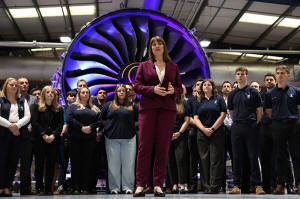UK becomes fastest-growing G7 economy after strong first quarter
[May 15, 2025] By
PAN PYLAS
LONDON (AP) — The British economy grew at its fastest rate in a year
during the first quarter of 2025, official figures showed Thursday, in a
welcome boost to the Labour government, which has made lifting the
country's growth its top priority.
The Office for National Statistics said growth, as measured by gross
domestic product, increased by 0.7% in the first quarter of the year
from the final three months of 2024, with the country's dominant
services sector doing particularly well.
The first quarter increase makes the British economy the fastest-growing
among the Group of Seven leading industrial nations.
Growth was modestly ahead of market expectations for a 0.6% increase. It
was also the biggest increase since the first quarter of 2024, when the
economy expanded by 0.9%.
Treasury chief Rachel Reeves welcomed the growth leap, and said the
figures showed the choices made by Labour since it was elected last July
were beginning to pay off.
“We’re set to be the fastest growing economy in the G-7 in the first
three months of this year and that’s incredibly welcome, but I know that
there is more to do," she said while on a visit to a Rolls-Royce factory
in Derby, northern England.
Most economists think is likely to slow down in the second quarter of
the year, partly because of the global uncertainty generated by U.S.
President Donald Trump's tariff policies.

[to top of second column] |

Britain's Chancellor of the Exchequer Rachel Reeves, center, speaks
with the media at the Rolls-Royce factory in Derby, England
following the announcement from the Office for National Statistics
that the U.K. economy grew by 0.7% between January and March,
Thursday, May 15, 2025. (Darren Staples/PA via AP)
 Though most tariffs were paused for
90 days following the ensuing market turmoil, including the 10%
baseline tariff applied to U.K. goods entering the U.S., the
backdrop for the global economy remains highly uncertain,
particularly if the U.S.-China trade war persists.
Some of that uncertainty, with regard to the British economy, lifted
Thursday when both Trump and British Prime Minister Keir Starmer
separately outlined details of a trade deal between the U.S. and the
U.K. Though Trump kept the 10% baseline tariffs on U.K., he agreed
to reduce the levies on British autos, steel and aluminum.
Sanjay Raja, chief U.K. economist at Deutsche Bank, said the growth
uptick will likely be short-lived, especially during the second
quarter when trade uncertainty will be at its peak.
“Exporters will likely see reduced demand as well from higher U.S.
tariffs and weaker global demand,” he said.
Economists said growth will likely falter in the second quarter as
new taxes on business were imposed in April. Also a raft of price
rises during the month, including domestic energy and water bills,
are expected to keep a lid on consumer demand.
All contents © copyright 2025 Associated Press. All rights reserved |